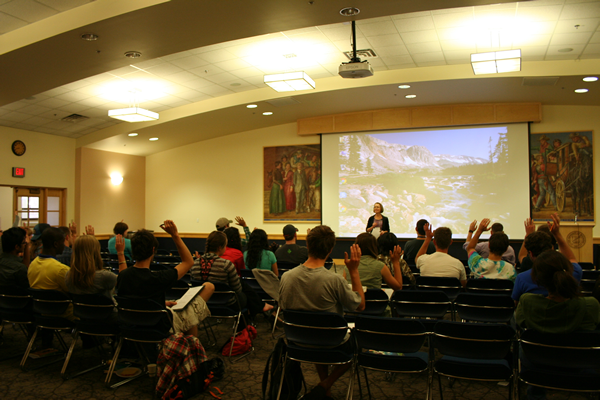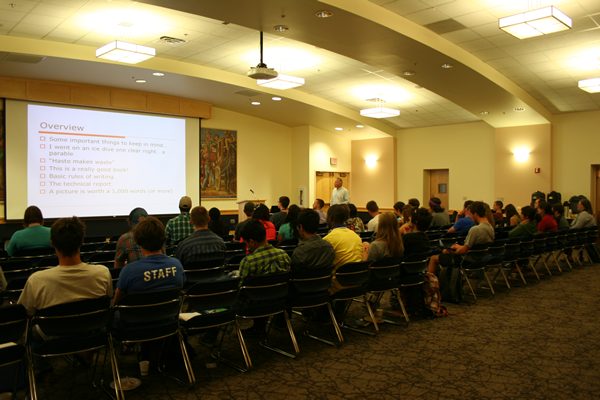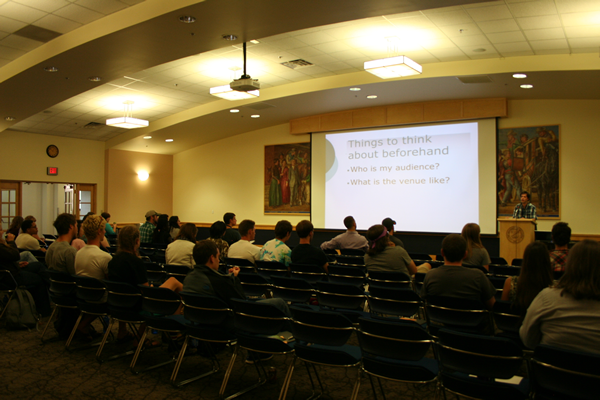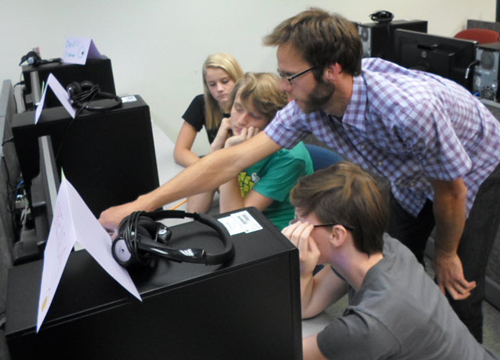Project and Water News
Get involved: organizations to maximize a STEM major
As CI-WATER partner institutions launch the 2014-2015 school year, we invite students to look into organizations that can help them find support and opportunities to grow a healthy STEM career.
Brigham Young University
University of Utah
- Student organizations for the College of Engineering
- Computer Science UgSAC
- Find more clubs at UU
University of Wyoming
Utah State University
- American Society of Landscape Architects
- Society of Environmental Engineering
- Find more clubs at USU
August 18, 2014
3 simple ways to boost a STEM major
The new academic year is booting up. Science and engineering majors everywhere are finalizing class schedules and thinking about how to make the most of the coming term. As important as going to class and completing assignments is, picking one or more of the following simple steps can boost the value of all that hard work:
1. Go to your professors’ office hours. Sure, you can send a needy email or wedge in that question in the pre- or post-class chaos, but if you really want professors to take an interest in your success, haul yourself to their office. So few students actually do this, you’ll step away from the pack right there. Don’t have a question about the coursework? Ask about the professor’s projects or suggestions for professional associations you should look into. You could learn a lot.
2. Get involved. Join the student chapter of at least one professional organization in your major and look for announcements on local events to attend. This will cost only as much as a couple of pizzas and bring you into contact with people and information you need to decide where to take your career. Want another low-cost ninja move? Volunteer to work in the lab for a professor you respect. More than one undergrad has earned a paid position down the road this way.
3. Start thinking about next summer. Believe it or not, now’s the time to look into summer programs that were offered last year and might be offered again. Ten minutes on your department’s website may be all it takes to find a couple that you want to come back to later in the year. Schedule an auto-reminder to check back: some announcements get buried in the noise later in the year. Find something you love? Choose project topics, classes and extracurriculars that can help you make a stronger application for that plum internship or research position.
Have another great idea to add? Tweet us at @CI-WATER.
August 4, 2014
Wyoming EPSCoR hosts annual Undergraduate Research Symposium
Undergraduate research can open many doors for students as they prepare to continue in higher education, pursue a career or learn more about the field that interests them. To help students build additional research skills, CI-WATER partner Wyoming EPSCoR, hosted their annual Undergraduate Research Symposium. The 2014 Symposium was held on July 21st at the University of Wyoming.
The goal of the Symposium was to give undergraduate students at the University of Wyoming and Wyoming community colleges the information and tools they need to succeed and excel in undergraduate research, including planning, designing, implementing and presenting their projects.
“It was an informative and inspiring gathering of faculty and students,” says Beth Cable, Coordinator of Education, Outreach and Diversity for Wyoming EPSCoR. “I appreciate the time that both took out of their busy summer schedules to participate in the event. Hopefully, the students gained further understanding of the impacts that doing research can have on their academic and professional careers and the professors saw some of the impressive research that University of Wyoming undergraduates are doing.”
Topics included technical writing, designing and presenting posters, scientists as entrepreneurs and more. Speakers from various departments at the University of Wyoming spoke to participants and gave students insight into what it means to be a researcher.

Dr. Anne Sylvester speaking to students

Dr. Cameron Wright, Associate Professor of Electrical and Computer Engineering speaking on Technical Writing

Dr. Will Welch, Post-Doctoral Research Associate, Chemical and Petroleum Engineering Dept. speaking on Designing and Presenting Posters
July 30, 2014
5 ideas for designing a teen code camp challenge
When asked to reflect on what comprises a well-designed problem that keeps kids interested, facilitators for this summer’s successful Code Camp at Utah State University offered these insights:
1) Pose an open-ended, real-world problem. By offering participants a problem that has no single correct answer, or even one best answer, you leave room for genuine discovery. A realistic problem enhances awareness of how code and computing is used in science and engineering without patronizing students, something teens appreciate.
2) Offer a clear focal point. For a one-day camp, limiting the challenge to revising a concise portion of code helps ensure that teams can complete the task. Providing a solution that can be both a positive model (it works) and a negative model (it results in unacceptably negative outcomes) helps participants better understand what they need to do. For example, the USU Code Camp’s “Pineview Reservoir Challenge” gives students a release rule (“keep the reservoir full”) that allows the model to run but generates negative revenue.
3) Give participants the bigger picture. Providing the additional code that teams need to check their solutions allows participants to try improving their work as time allows. For “The Pineview Reservoir Challenge,” teams downloaded code from a larger Python model of the reservoir that spanned 55 years and generated both the overall revenue and numerous subsidiary results. Participants also received an Excel file and tool for viewing results after each run.
4) Test everything! Before the camp, be sure the base code and visualization of results run smoothly. On camp day, you’ll be very glad you did.
5) Staff your camp well. Have at least one experienced coder per team so participants can receive coaching the moment they need it. Not only does this help improve progress toward finding solutions, it minimizes frustration and helps keep the teens engaged with the task.

Having plenty of experienced coders on hand is essential for providing timely guidance to new coders.







